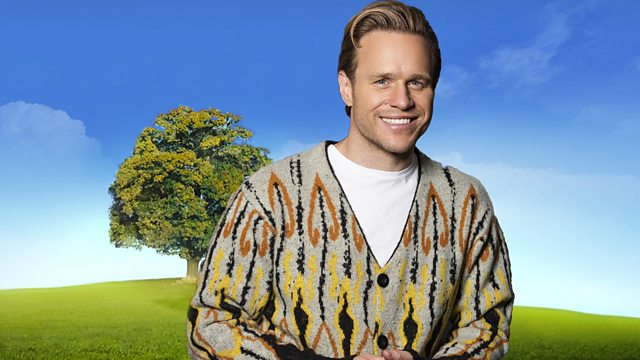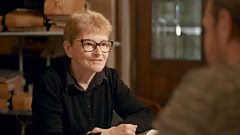Olly Murs
Olly Murs explores his grandfather’s Latvian roots and discovers his great-grandparents were circus performers, and how a wartime decision led to a tragic family estrangement.
After winning The X Factor in 2009, Olly Murs went on to become a megastar, selling out arenas worldwide. It’s been a rollercoaster journey, but he always returns to his home in Essex. People presume he’s from Essex, but Olly is actually quarter-Latvian. His late grandfather Eddie was from Latvia, but Olly knows very little about this side of the family and wants to find out more.
Olly starts his research by visiting his father, Pete, who talks about the trip he and Eddie took to Riga, Latvia, in 2002. It was the first time Olly’s grandfather opened up about his past, telling Pete that during the Second World War his mother, Veronika, handed him over to his father and stepmother. They left Latvia for Germany and then England, and it was the last time Eddie saw his mother.
Eddie spent his life believing his mother had abandoned him, and no-one in the family knew what happened to Veronika. Olly also discovers that Eddie was illegitimate, and that Olly’s great-grandfather, Eduard Murs, was a circus performer who was married to his wife Katrine when Eddie was born.
Olly travels to Riga to see what he can uncover about his family there. His first stop is the circus where his great-grandfather Eduard worked. Olly meets the circus’s archivist Elvira Avota, who shows him documents relating to his great-grandfather and his wife Katrine, and their extraordinary double act. Olly learns that they went on tour, including to Finland.
While Olly now knows more about his circus performer great-grandfather, he hasn’t found any evidence of his great-grandmother Veronika. At the Latvian State Historical Archives, Olly is astonished to discover they hold a collection of old passports. Head archivist Rita Bogdanova shows Olly his great-grandmother’s passport, and he is delighted to discover that she worked as a trapeze artist. Her passport contains a work visa for Finland. Olly also sees his great-grandfather’s passport, which has the exact same visa. Now Olly knows that his great-grandparents worked at the same circus, and that Eddie was probably conceived following an affair in Finland. But Eduard Murs remained married to his wife Katrine.
Housing records guide Olly to a flat where Veronika and her new baby lived in Riga, but other records reveal that after a few months, Olly’s grandfather Eddie was sent to live with Veronika’s parents. Olly speculates that perhaps his great-grandmother couldn’t manage as a single mother supporting her son. Newspaper reviews show that she went back to work on the trapeze not long after Eddie was born. Olly also discovers that when he was seven, Olly’s grandfather Eddie was back living with his mum, but it was 1939 and the Second World War was looming.
At the Museum of the Occupation, Olly learns that during the war, Latvia moved between Soviet and Nazi occupation. In 1944, with Soviet forces at the borders, Olly's great-grandmother Veronika made a heart-breaking decision. Documents show that Olly’s great-grandfather Eduard, his wife Katrine and his grandfather Eddie all left Riga for Germany. Olly wants to know why Veronika stayed behind. The museum curator explains it could have been because her application to leave was turned down. Olly now believes that Veronika was making what she thought to be the best decision for her son. Olly then finds records that show Eddie went from a refugee camp in Germany to Harwich in Essex - just down the road from where Olly lives now.
Olly now knows how his grandfather Eddie came to England, but what happened to his great-grandmother left behind in Latvia? At the Latvian State Archives, historian Daina Bleiere shows Olly documents that relate to his great-grandmother. Olly discovers that in 1951, Veronika was put on trial, accused of making ‘anti-Soviet statements’. He’s shocked to learn that she was found guilty and sentenced to eight years in a labour camp. It was an extremely harsh regime, which many prisoners didn’t survive. Olly is relieved to find out that Veronika did survive and was released after five years to return to Riga. After her release, Veronika placed adverts in newspapers looking for her son Eddie and also approached the International Red Cross. Olly reflects on how his grandfather believed that his mother had abandoned him and never loved him, but here is proof that Veronika longed to see her son again.
In a final moving scene, Olly visits the cemetery where Veronika was buried in an unmarked grave, as there were no relatives to pay for the burial. Olly calls his father to share the news that he has found Veronika’s final resting place and has answers to some of his late grandfather Eddie’s questions.
Last on
More episodes
Previous
Clips
-
![]()
Olly Murs discovers that performing runs in the family
Duration: 02:00
-
![]()
Olly Murs hears a heartbreaking family story
Duration: 01:50
Credit
| Role | Contributor |
|---|---|
| Production Company | Wall to Wall Media |
Broadcasts
- Thu 19 Sep 2024 21:00
- Wed 25 Sep 2024 01:45
- Thu 26 Sep 2024 00:40������̳ One except Northern Ireland, Northern Ireland HD, Scotland, Scotland HD, Wales & 1 more
Featured in...
![]()
Who Do You Think You Are?
Lost connections and unfamiliar histories are revealed.
Curious about your family history?
������̳ History has plenty of tips to help you get started.





